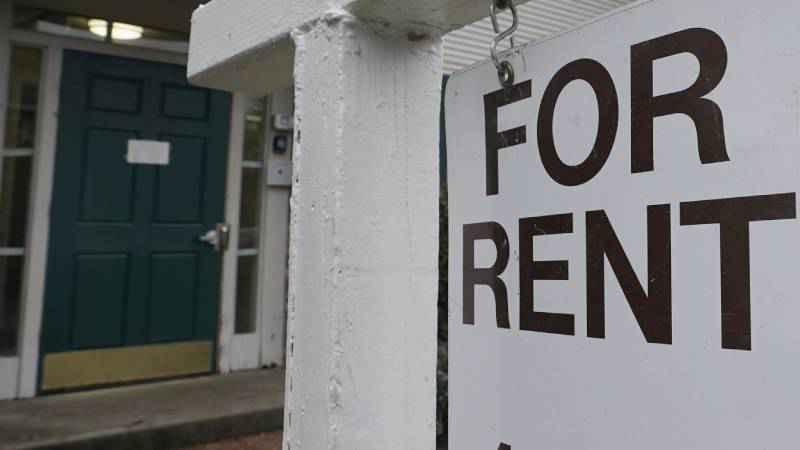As evictions moratorium set to expire, a look at the situation in Minnesota

In this Jan. 27, 2021, file photo, a For Rent sign is posted in Sacramento, Calif.[AP Photo/Rich Pedroncelli, File]
A federal freeze on most evictions that was enacted last year is scheduled to expire Saturday, after the Biden administration extended the original date by a month. The moratorium put in place by the Centers for Disease Control and Prevention in September has been the only tool keeping millions of tenants in their homes. Many of them lost jobs during the coronavirus pandemic and have fallen months behind on their rent.
Landlords successfully challenged the order in court, arguing that they also had bills to pay. They pointed out that tenants could access nearly $47 billion in federal money set aside to help pay rents and related expenses.
Advocates for tenants said the distribution of the money had been slow and that more time was needed to distribute it and repay landlords. Without an extension, they feared a spike in evictions and lawsuits seeking to oust tenants who were behind on their rents.
Even with the delay, roughly 3.6 million people in the U.S. as of July 5 said they would face eviction within the next two months, according to the U.S. Census Bureau’s Household Pulse Survey. The survey measures the social and economic effects of the pandemic every two weeks through online responses from a representative sample of U.S. households.
Here’s the situation in Minnesota:
WHAT’S THE STATUS OF THE EVICTION MORATORIUM IN MINNESOTA?
Finding a way to gradually end the state’s eviction moratorium that Democratic Gov. Tim Walz imposed in the early days of the pandemic was one of the priorities for the Legislature’s special session in June. Negotiators announced a bipartisan agreement that they said offered strong protections and clear timelines for people who owe back rent to secure assistance, which is paid directly to landlords.
Under the new rules, landlords are required through Oct. 12 to send notices to tenants who are behind on their rent 15 days prior to eviction for nonpayment. Landlords on June 30 got the right to start evicting tenants who were behind on rent and who qualified for rental assistance but refused to apply for it.
Since July 14, landlords have been allowed to evict tenants who "materially violate" other terms of their lease agreements, but not just for failing to pay rent. Tenants who haven’t paid their rent and aren’t eligible for COVID-19 rental assistance can be evicted starting Sept. 12. As of Oct. 12, all eviction protections will be lifted except for eligible renters with pending aid applications. Tenants who have claimed but not yet received the state aid are protected from eviction until next June 1.
WHAT’S BEING DONE TO HELP MINNESOTANS FACING EVICTION?
Minnesota is making $672 million in federal aid available through RentHelpMN.org to tenants in need, although landlords and tenant advocates say the program’s rules are too cumbersome and that the pace of payments has been too slow. To qualify, an applicant’s household income may not exceed 80% of the median income of an applicant’s home county. Applicants can ask for aid retroactive to March 13, 2020, and up to three months of future rent, for a total of 15 months’ worth.
According to the statewide program’s dashboard, about 34,500 applications seeking a total of nearly $198 million had been submitted by July 22, and the program had paid out nearly $25 million. Those figures did not include applications that were processed directly by four large counties in the Minneapolis-St. Paul area and nine tribal governments.
HOW ARE MINNESOTA COURTS HANDLING EVICTIONS?
The governor’s moratorium put most eviction lawsuits on hold, though courts recently started accepting filings allowed by the new rules. The Minnesota Multi Housing Association, which represents landlords who own about half of the state’s rental units, sued to try to force an end to the moratorium but dropped the case after Walz signed off on the new rules.
WHAT IS THE AFFORDABILITY IN THE STATE’S MAJOR RENTAL MARKETS?
Minneapolis, St. Paul and some other Minnesota cities traditionally have tight rental housing markets, although vacancy rates have risen during the pandemic. As of June, the overall median monthly rent in the Minneapolis-St. Paul metropolitan area had risen by 2.3% over the last year, to $1,495, according to a report released July 15 by Realtor.com. Median rents for a two-bedroom apartment rose by 8.2%, to $1,812.
Efforts are underway to put rent control measures on the November ballot in Minneapolis and St. Paul.
ARE EVICTIONS EXPECTED TO CREATE A SURGE IN HOMELESSNESS?
It’s hard to say how much homelessness might increase once evictions ramp up. State Rep. Michael Howard, a Democrat from Richfield who was one of the lead negotiators in crafting the new rules, said they would provide some of the strongest protections for renters anywhere in the country. One indication of the scope of renter concern, however, is recent census data showing that 7,397 state residents were concerned they could be evicted within two months.